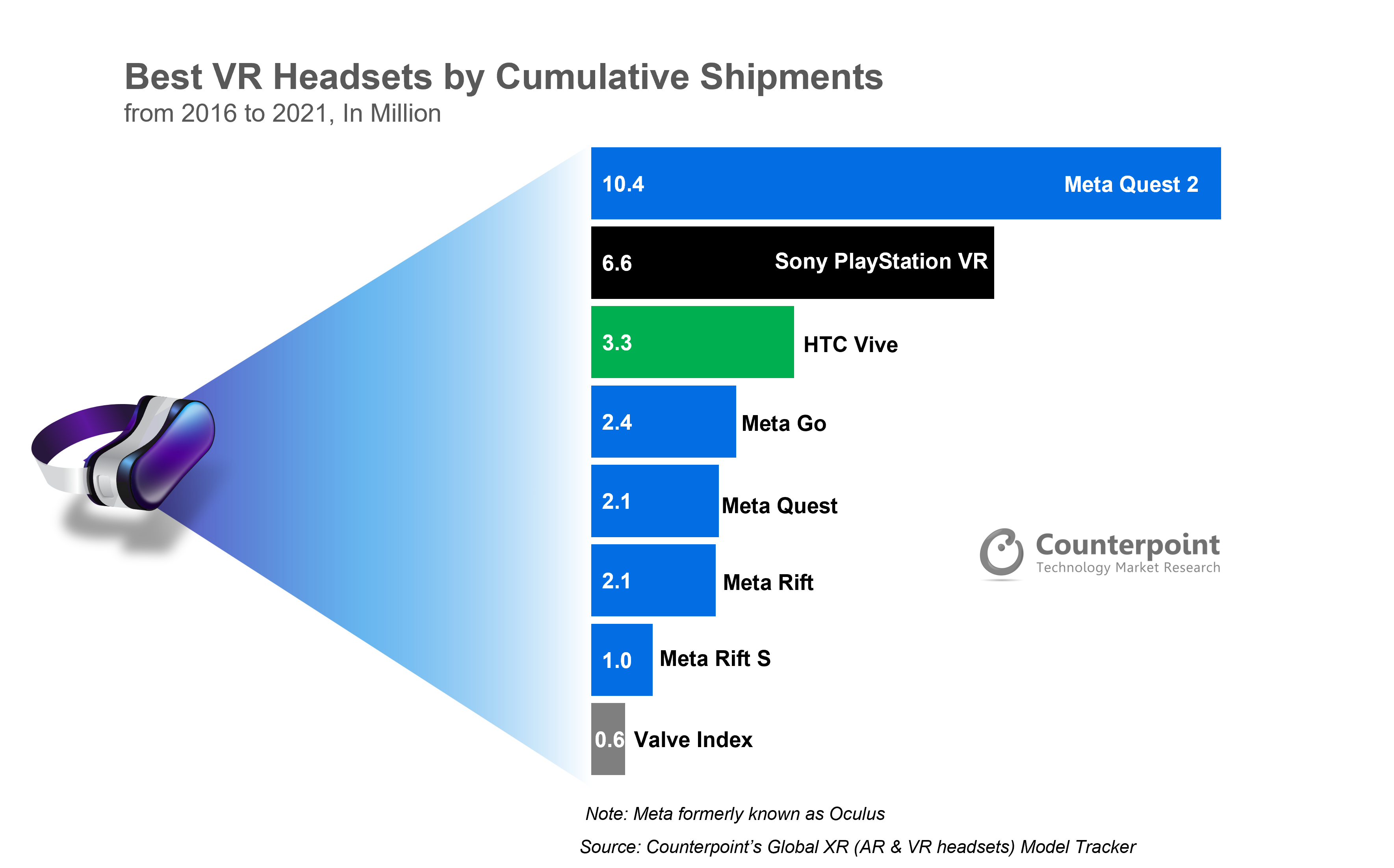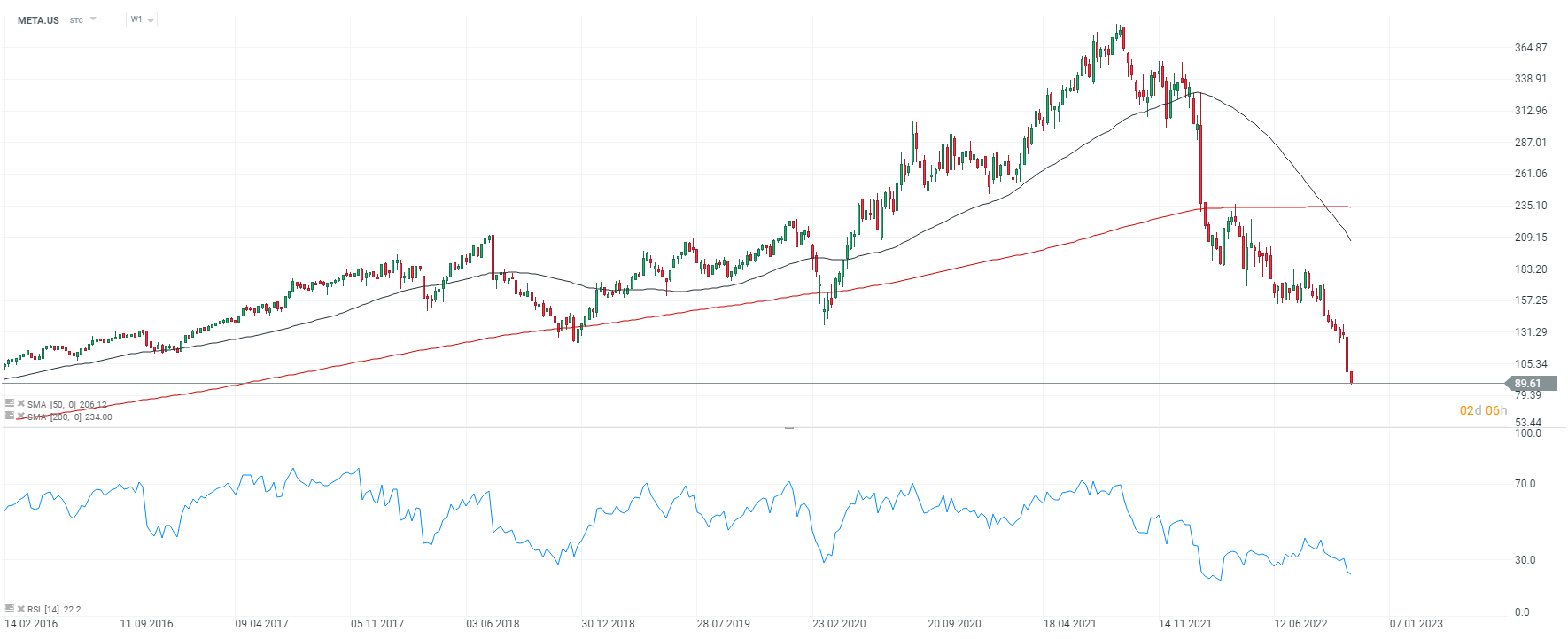Meta Platforms (META.US) shares settled below $90 today. The company is being dragged down by rising development and research spending on virtual reality technologies and negative investor sentiment toward risk. In Q3 2021, META's free cash flow was $12.8 billion; it now stands at $317 million. This represents a massive decline in less than a year and also the lowest level in a decade. In addition, shareholders are clearly uncomfortable with the lack of a dividend policy and Zuckerberg's near-total control over setting the company's direction, based on the shareholder structure. The company's valuation has melted by nearly 70% since the beginning of the year, with a capitalization loss of more than $660 billion, which is roughly equivalent to Warren Buffett's entire fund, Berkshire Hathaway.
Bad times for new technology?
A hawkish Jerome Powell and an interest rate hike-focused central bank in the U.S. is a highly unfavorable environment for investment in new technologies. Rising rates mean rising financing costs. In addition, slowing economic activity is causing advertisers to cut back on ad spending, which is hurting Meta, whose main source of revenue is still Facebook and Instagram. The market seems to doubt the success of Mark Zuckberg's futuristic, dangerous visions and fears the possible effects of the company's failure.
Is the Metaverse a bottomless pit?
Zuckerberg signaled as early as 2021 that the company would undergo a transformation from a social hub of popular apps and platforms, to a technology company focused on moving user activity into virtual reality, dubbed Metaverse. Since the inception of its Reality Labs division, Meta has spent nearly $36 billion on development in this area, and returns are not even on the horizon yet.
Zuckerberg's vision - far from generating profits
Mark Zuckerberg is focused on increasing spending on the virtual reality segment at a time when Europe's biggest war in 80 years is underway, inflation has become a massive problem for the global economy, energy prices are raging and consumer sentiment is nowhere near as euphoric as it was a year ago. The economic slowdown is knocking on the door of the new technology and equipment market. It's hard to expect investors to like the idea of entrusting their own funds to Zuckerberg's 'vision of virtual reality' in such an extremely uncertain macro environment. Just nearly a year ago, the market reacted euphorically to news of the creation of the Metaverse. Share prices of companies like Unity and Matterport literally exploded, as did cryptocurrencies offering platforms in the metaverse space like Decentraland and Sandbox. Today, we see that market sentiment has changed, and the pendulum is starting to swing out in the opposite direction. Meta Platforms' valuation fundamentally now seems potentially the most attractive of all US major tech stocks.
It has a C/Z ratio of about 8.8 points, a C/WK ratio of about 2 points, and a debt-to-equity ratio of about 0.08. Metaverse's spending of about $36 billion since Reality Labs' inception may indeed 'scare' investors to whom the concept of virtual worlds does not appeal, but its scale does not seem as massive as it looks when one considers the value of the company's revenues. In the last two quarters, Meta's revenues totaled about $55 billion. Has Wall Street caved and overreacted with panic? As the percentage of quarterly spending on the Metaverse increases, the company's share price is falling. Currently, Metaverse spending is already close to 33% of quarterly revenue and continues to rise. The average for the past two years is roughly 23.3%. Share price as of October 30. Source: Ycharts
As the percentage of quarterly spending on the Metaverse increases, the company's share price is falling. Currently, Metaverse spending is already close to 33% of quarterly revenue and continues to rise. The average for the past two years is roughly 23.3%. Share price as of October 30. Source: Ycharts
Meta is still powerful
Zucerkberg's company still has nearly 4 billion people using its apps and platforms like Facebook and Instagram. It seems very likely that ad revenues will jump once advertisers significantly increase ad spending, and the macro landscape will improve as inflation falls. With both social media platforms giving Meta its largest global 'market', the company may still be the 'first choice' for many advertisers. However, it faces Apple's policy of limiting its ability to track its own users' activities and personalize ads. In addition, the market for so-called VR headsets has been dominated by devices produced by Zuckerberg's company, Oculus. The company was absorbed by Meta back in 2014. Competition in price and quality for VR kits provided by Meta is still not seen on the horizon (which does not mean that one will not appear). Oculus headsets continue to beat the biggest competing brands in popularity, 'divide and rule' in the market of new virtual reality technologies and enjoy very positive feedback from users. Source: Counterpoint
Oculus headsets continue to beat the biggest competing brands in popularity, 'divide and rule' in the market of new virtual reality technologies and enjoy very positive feedback from users. Source: Counterpoint Meta Platforms (META.US) share price. Source: xStation5
Meta Platforms (META.US) share price. Source: xStation5
Talpra Tréder - 2025.12.15.
A Broadcom részvényei 5%-ot esnek a robusztus eredmény és az AI kereslet ellenére 🗽
Reggeli összefoglaló (12.12.2025)
Reggeli összefoglaló (10.12.2025)
Ezen tartalmat az XTB S.A. készítette, amelynek székhelye Varsóban található a következő címen, Prosta 67, 00-838 Varsó, Lengyelország (KRS szám: 0000217580), és a lengyel pénzügyi hatóság (KNF) felügyeli (sz. DDM-M-4021-57-1/2005). Ezen tartalom a 2014/65/EU irányelvének, ami az Európai Parlament és a Tanács 2014. május 15-i határozata a pénzügyi eszközök piacairól , 24. cikkének (3) bekezdése , valamint a 2002/92 / EK irányelv és a 2011/61 / EU irányelv (MiFID II) szerint marketingkommunikációnak minősül, továbbá nem minősül befektetési tanácsadásnak vagy befektetési kutatásnak. A marketingkommunikáció nem befektetési ajánlás vagy információ, amely befektetési stratégiát javasol a következő rendeleteknek megfelelően, Az Európai Parlament és a Tanács 596/2014 / EU rendelete (2014. április 16.) a piaci visszaélésekről (a piaci visszaélésekről szóló rendelet), valamint a 2003/6 / EK európai parlamenti és tanácsi irányelv és a 2003/124 / EK bizottsági irányelvek hatályon kívül helyezéséről / EK, 2003/125 / EK és 2004/72 / EK, valamint az (EU) 2016/958 bizottsági felhatalmazáson alapuló rendelet (2016. március 9.) az 596/2014 / EU európai parlamenti és tanácsi rendeletnek a szabályozási technikai szabályozás tekintetében történő kiegészítéséről a befektetési ajánlások vagy a befektetési stratégiát javasló vagy javasló egyéb információk objektív bemutatására, valamint az egyes érdekek vagy összeférhetetlenség utáni jelek nyilvánosságra hozatalának technikai szabályaira vonatkozó szabványok vagy egyéb tanácsadás, ideértve a befektetési tanácsadást is, az A pénzügyi eszközök kereskedelméről szóló, 2005. július 29-i törvény (azaz a 2019. évi Lap, módosított 875 tétel). Ezen marketingkommunikáció a legnagyobb gondossággal, tárgyilagossággal készült, bemutatja azokat a tényeket, amelyek a szerző számára a készítés időpontjában ismertek voltak , valamint mindenféle értékelési elemtől mentes. A marketingkommunikáció az Ügyfél igényeinek, az egyéni pénzügyi helyzetének figyelembevétele nélkül készül, és semmilyen módon nem terjeszt elő befektetési stratégiát. A marketingkommunikáció nem minősül semmilyen pénzügyi eszköz eladási, felajánlási, feliratkozási, vásárlási felhívásának, hirdetésének vagy promóciójának. Az XTB S.A. nem vállal felelősséget az Ügyfél ezen marketingkommunikációban foglalt információk alapján tett cselekedeteiért vagy mulasztásaiért, különösen a pénzügyi eszközök megszerzéséért vagy elidegenítéséért. Abban az esetben, ha a marketingkommunikáció bármilyen információt tartalmaz az abban megjelölt pénzügyi eszközökkel kapcsolatos eredményekről, azok nem jelentenek garanciát vagy előrejelzést a jövőbeli eredményekkel kapcsolatban.


